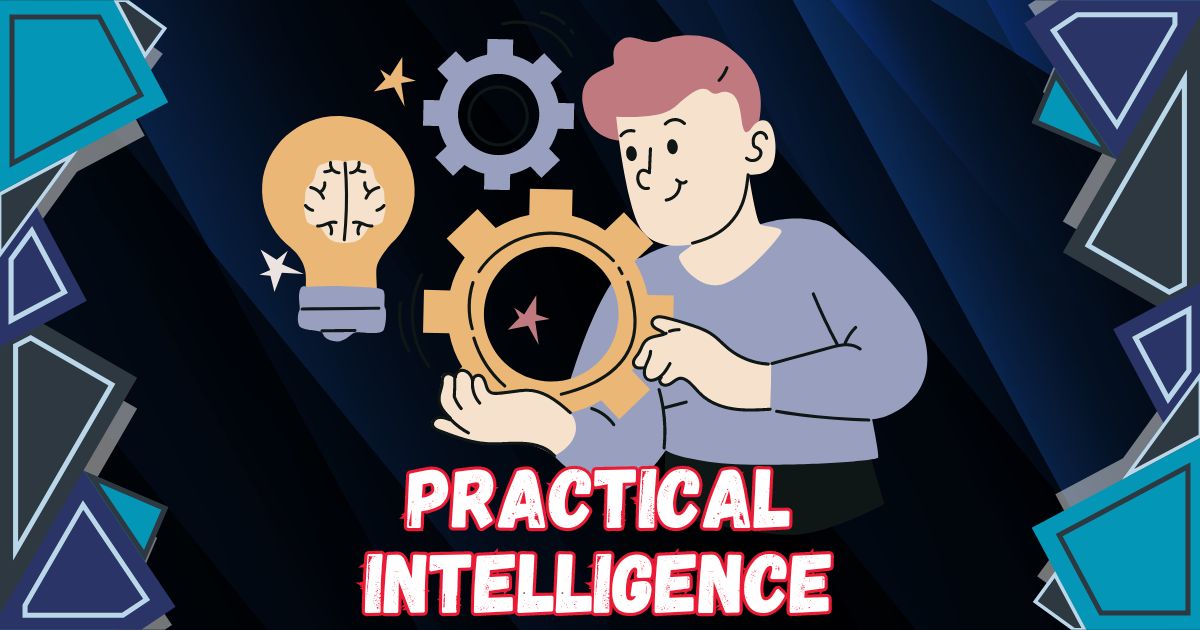In a world that places high value on intelligence, people often overlook the significance of practical intelligence, which plays a crucial role in navigating real-life challenges. While academic knowledge and IQ often measure one’s intellectual capabilities, practical thinking focuses on street smarts, common sense, and the ability to solve problems in real-time situations. In this blog post, we’ll explore 5 key benefits of developing real-world problem-solving abilities, how they impact decision-making, and why they’re essential for achieving success in both personal and professional life.
What is Practical Intelligence? A Simple Explanation
This type of intelligence refers to the ability to solve everyday problems using common sense, intuition, and real-world experience. Unlike analytical skills, often measured by IQ tests, this type of intelligence is about applying knowledge and skills to resolve daily challenges. This capability helps people adapt to changing environments, make sound decisions, and handle complex situations efficiently.
Defining Practical Intelligence
This form of intelligence is sometimes referred to as “street smarts” or “tacit knowledge.” It involves using life experiences and learned knowledge to tackle problems. It’s closely related to contextual awareness, as it enables individuals to assess situations and take appropriate actions based on circumstances.
How Practical Intelligence Differs from Analytical Intelligence
While analytical intelligence is concerned with logic, reasoning, and solving theoretical problems (like puzzles or math equations), practical skills are applied in real-life settings. For instance, knowing how to handle an interpersonal conflict at work or figuring out the best route to take during an emergency are examples of real-world problem-solving in action.
How Practical Intelligence Helps in Problem-Solving
Problem-solving is a fundamental skill in everyday life, and this type of intelligence plays a vital role in finding workable solutions to both simple and complex issues. People with strong practical abilities tend to adapt quickly, use creative approaches, and remain calm under pressure.
1. Adaptability in Changing Environments
Practical intelligence enables individuals to adapt to various environments by reading the room, understanding the social context, and responding accordingly. Whether it’s adjusting to a new workplace or finding an immediate solution to an unexpected problem, practical thinking helps individuals remain flexible and adaptable.
2. Using Intuition and Experience
While analytical intelligence may rely on data and logical reasoning, practical skills often draw on intuition and personal experience. People with strong real-world thinking know how to apply past experiences to current situations, using their knowledge to solve problems efficiently.
3. Staying Calm Under Pressure
When faced with stressful or urgent problems, practical thinking allows individuals to keep their composure and think critically about their next steps. This emotional control is key to making well-informed decisions in high-stakes environments.
Practical vs. Emotional Intelligence: Key Differences
While practical and emotional intelligence are often complementary, they serve different purposes. Understanding the distinction between the two can help you develop both skill sets effectively.
Practical Intelligence
Real-world problem-solving is about using logic, experience, and contextual understanding. It’s focused on applying knowledge in everyday settings and is often referred to as street smarts.
Emotional Intelligence
On the other hand, emotional intelligence is the ability to recognize, understand, and manage one’s own emotions as well as the emotions of others. It’s essential for maintaining strong relationships, navigating social situations, and fostering empathy.
Key Differences
- Focus: This form of intelligence focuses on problem-solving, while emotional intelligence centers on emotional awareness.
- Application: Practical thinking is applied to real-life tasks, such as managing work challenges or daily activities, whereas emotional intelligence is critical for interpersonal interactions.
- Outcome: Practical skills help individuals get things done, while emotional intelligence improves relationship management and social harmony.
Real-World Applications of Practical Intelligence
This type of intelligence is used daily in various situations, from the workplace to home life. Below are some key areas where these skills play a pivotal role:
1. Navigating the Workplace
In the professional world, practical intelligence helps individuals understand how to deal with office politics, manage teams, and make quick decisions that align with the organization’s goals. Knowing when to take initiative, how to lead a team, and how to handle conflicts are all examples of this type of thinking in action.
2. Handling Personal Relationships
Whether in friendships, family, or romantic partnerships, practical skills help people navigate complex social dynamics. It enables individuals to recognize the best course of action when resolving conflicts, addressing misunderstandings, or making compromises.
3. Managing Daily Challenges
From fixing a broken appliance to organizing a family vacation, practical skills allow individuals to make quick decisions and solve problems efficiently. Those with high practical intelligence are known for their ability to think on their feet and find immediate solutions to everyday issues.
How to Develop Practical Intelligence: 5 Proven Strategies
Although some people may naturally possess a high level of practical intelligence, it’s a skill that can be developed and improved over time. Here are 5 proven strategies to enhance your real-world problem-solving abilities:
1. Learn Through Experience
The more real-world experiences you encounter, the better equipped you are to handle future challenges. Step out of your comfort zone, engage in new activities, and learn from your mistakes. Each experience provides valuable lessons that build your practical skills.
2. Observe and Reflect
Observe how others solve problems, particularly those who are highly successful in practical situations. Reflect on their approaches and consider how you can apply similar methods in your own life. Self-reflection also allows you to evaluate your problem-solving strategies and make improvements.
3. Develop Critical Thinking Skills
To improve your practical-intelligence, focus on developing your critical thinking abilities. Ask yourself questions like “What’s the most efficient way to solve this problem?” or “What past experience can I draw from to resolve this issue?” By sharpening your critical thinking, you can better analyze situations and make informed decisions.
4. Stay Open-Minded
This form of intelligence requires flexibility. Be open to new perspectives, different approaches, and alternative solutions to problems. By staying open-minded, you allow yourself to adapt and make adjustments as new information becomes available.
5. Build Emotional Control
While emotional intelligence plays a key role in managing emotions, emotional control is essential for practical thinking as well. Learn to manage stress and stay calm under pressure to make better decisions, especially in high-stress environments.
The Role of Practical Intelligence in Business and Leadership
In the business world, practical intelligence is an invaluable asset for leaders and managers. Successful business leaders often rely on common sense, experience, and contextual awareness to navigate challenges, make strategic decisions, and inspire their teams.
1. Making Informed Decisions
Leaders with strong practical intelligence understand how to assess the context of a problem, weigh their options, and make decisions that benefit both their teams and the organization. They are adept at identifying which resources to leverage and when to take action.
2. Navigating Complex Situations
In today’s fast-paced business world, situations can change rapidly. Leaders with practical intelligence are able to adapt to these changes, manage crises, and find solutions that keep the business moving forward. They can make quick, informed decisions even with limited information.
3. Effective Leadership
Leaders who excel in practical intelligence understand how to inspire and motivate their teams. They know how to handle interpersonal conflicts, delegate responsibilities effectively, and ensure that team goals are met in a timely and efficient manner.
If you’re looking to see how strategic HR consulting can elevate your business to new heights, check out our article on 10 Reasons Why Pedrovazpaulo Human Resource Consulting Transforms Businesses for insights on why expert HR advice is crucial for long-term success.
Practical Intelligence Examples: How It Works in Real Life
To better understand how practical intelligence works, let’s look at some real-world examples:
1. Managing a Crisis at Work
Imagine a manager facing a sudden staff shortage during a busy season. With strong practical skills, the manager would quickly assess the situation, prioritize tasks, redistribute responsibilities, and communicate effectively with the team to ensure smooth operations despite the challenge.
2. Solving a Family Dispute
In family dynamics, practical intelligence plays a key role in resolving disputes. For instance, during a disagreement between siblings, a parent with high practical intelligence would recognize the emotions involved, mediate calmly, and propose a compromise that addresses everyone’s concerns.
3. Troubleshooting Technology Issues
A person with practical intelligence doesn’t need to be an expert in technology to troubleshoot a broken device. They may not know the technical jargon, but they can figure out which steps to take by applying common sense, researching solutions, and trying different approaches until they resolve the issue.
Conclusion: Why Practical Intelligence is Essential for Everyday Success
While traditional measures of intelligence focus on academic or theoretical abilities, practical intelligence is equally important for navigating real-world situations. From solving everyday problems to making strategic decisions in business, these skills equip individuals with the tools they need to thrive in their personal and professional lives. By actively developing your practical intelligence through experience, observation, and critical thinking, you can enhance your ability to solve problems, adapt to changing circumstances, and achieve success in various aspects of life.
FAQs About Practical Intelligence
- What is practical intelligence?
It’s the ability to solve everyday problems using common sense, real-world experience, and contextual understanding. - How is practical intelligence different from emotional intelligence?
Practical intelligence focuses on solving real-world challenges, while emotional intelligence is about managing emotions and relationships. - Can practical intelligence be developed?
Yes, practical intelligence can be improved through experience, critical thinking, and self-reflection. - What are some examples of practical intelligence?
Examples include managing a crisis at work, resolving interpersonal conflicts, and troubleshooting technical issues. - Why is practical intelligence important in business?
It helps leaders make informed decisions, adapt to challenges, and effectively manage teams. - How does practical intelligence help in problem-solving?
It allows individuals to draw from past experiences and apply intuition to find solutions quickly and efficiently. - What are some strategies to improve practical intelligence?
Strategies include learning from real-life experiences, observing others, developing critical thinking skills, and staying open-minded. - Can practical intelligence help in personal relationships?
Yes, it helps individuals navigate social dynamics, resolve conflicts, and build stronger connections. - Is practical intelligence more important than analytical intelligence?
Both forms of intelligence are valuable, but practical intelligence is crucial for handling real-world situations effectively. - How does practical intelligence impact leadership?
It equips leaders with the skills to navigate complex situations, inspire teams, and make strategic decisions.

Joseph Bush is a seasoned writer and researcher with over 7 years of experience covering a wide range of general topics, from lifestyle and technology to business and current events. He is dedicated to producing fact-checked, reader-friendly content that informs, engages, and empowers readers.
Throughout his career, Joseph has followed strict editorial guidelines, relied on reputable sources, and ensured every article meets the highest standards of accuracy and clarity. His expertise spans multiple fields, allowing him to explain complex topics in a way that’s easy to understand.
Passionate about continuous learning, Joseph stays updated on industry trends and best practices to deliver trustworthy, well-rounded insights. Readers can rely on his work for its credibility, depth, and real-world relevance.




